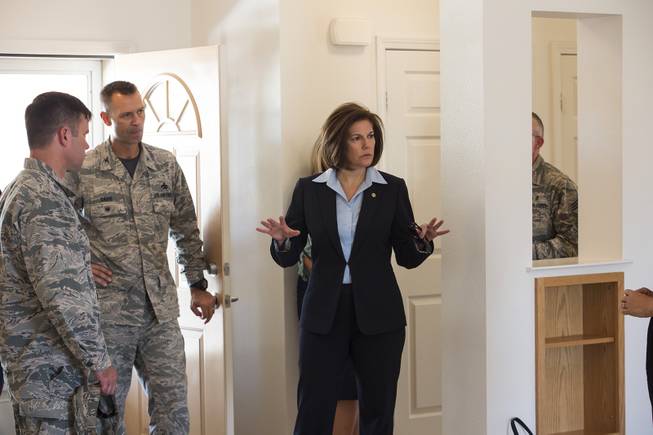
Nevada Senator Catherine Cortez Masto takes a tour of on-base housing for servicemembers and their families stationed at Nellis Air Force Base, Friday Aug. 24, 2018.
Tuesday, June 11, 2019 | 2 a.m.
Sen. Catherine Cortez Masto, D-Nev., has stayed in the public eye with staunch opposition to the Yucca Mountain nuclear waste repository in her home state.
The clash between Cortez Masto — and the rest of the Nevada delegation — with Energy Secretary Rick Perry has continued throughout the congressional session. That fight is still ongoing.
But that’s not all she is working on. The senator recently talked with the Sun about some of the legislation she has co-sponsored.
Missing and murdered indigenous women
Cortez Masto helped introduce multiple bills targeting the epidemic of missing and murdered indigenous women.
She initially started working with stakeholders, including tribal leaders, during her time as Nevada attorney general. When she got to the Senate, she wanted to be an advocate for tribal communities.
“What I learned was a lot of the support and resources that they need comes from the federal level, federal agencies,” she said.
To increase the level of cooperation between different law enforcement agencies on the issue, Cortez Masto helped reintroduce Savanna’s Act, named for Savanna LaFontaine-Greywind, a Native American woman who was killed in 2017. Her unborn daughter was cut from her womb.
Native American women face increased rates of violence in the United States, with some estimates putting them at 10 times more likely to be murdered than the national average. Murder is the third-leading cause of death for Native American women ages 10-24.
This bill was originally sponsored by then-Sen. Heidi Heitkamp, D-N.D., who lost her bid for re-election in the 2018 midterms, and Sen. Lisa Murkowski, R-Alaska, in October 2017. Murkowski has remained on the bill’s newest incarnation.
The bill would define the specific responsibilities of state, federal and tribal law enforcement in regard to investigating missing and murdered indigenous women by directing the federal Department of Justice to create guidelines around inter-jurisdictional cooperation and data collection around the crimes.
The bill would also allow tribes further access to certain federal crime databases and require certain annual reporting of statistics around missing and murdered Native American women. These decisions would all be made in consultation with tribes.
Cortez Masto said it is important to collect data and statistics in order to help solve the issue.
“Nobody focused on it. Nobody was collecting the data,” Cortez Masto said.
Another bill Cortez Masto has helped sponsor, alongside Murkowski and Sen. Jon Tester, D-Mont., is the Not Invisible Act.
This bill would create an advisory committee on violent crime comprising multiple stakeholders, including representatives of tribal, state and local law enforcement, relevant federal agencies and tribal leaders.
It would also create a designated official in the Bureau of Indian Affairs who would “coordinate violent crime prevention efforts across federal agencies.”
Cortez Masto said it is important to have tribal voices involved in the process of trying to tackle the problem.
“(We want to) bring the tribes along, working with them, creating advisory committees so you have all the stakeholders involved,” she said.
Military housing upgrades
Cortez Masto has also signed onto the Better Military Housing Act, a bill targeted at ensuring safe housing standards in privatized military housing. The bill is being carried in the House by Reps. Jimmy Panetta, D-Calif., and Richard Hudson, R-N.C.
Cortez Masto said the issue came up during a tour of Nellis Air Force Base. “The No. 1 issue I heard was the housing issue," she said.
In a report on military housing presented to the Senate Committee on Armed Services’ Joint Subcommittee on Personnel, Readiness, and Management Support earlier this year, the Military Family Advisory network found over 55% of respondents had a negative experience with privatized military housing.
These experiences included unsafe conditions including mold, lead paint and pesticides and were not exclusive to one company — 35 companies were referenced by respondents.
“If we’re going to contract (housing) out, then we better hold those contractors accountable,” Cortez Masto said.
Respondents to the report also said they felt pressure from housing company representatives and sometimes military command, and that requests for remediation were often ignored.
“The legislation is important to address the needs in our military families, and I want to make sure that happens,” she said.
The Mueller Report and Senate leadership
Cortez Masto stopped short of calling for the impeachment of President Donald Trump, instead saying Congress should continue its oversight responsibilities.
“I continue to support the oversight activity of Congress because it is so necessary,” she said.
The report did bring her concern, however. She is especially concerned about Russian interference in the 2016 election, an action she said she has not heard “one thing” from Trump on.
“I have concerns that (Russia is) going to interfere with the coming election process,” she said.
She expressed exasperation with Senate Majority Leader Mitch McConnell, R-Ky., and what she saw as a stalled Senate focused only on maintaining control of the judicial branch.
“It is a legislative graveyard,” she said. “The only thing that we’ve been doing is moving judges.”
The country, she said, is suffering for lack of action.
“I think it’s a travesty,” she said.
